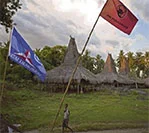NOW that the parliamentary elections of Indonesia are over, the horse-trading between the parties has begun. The failure of the Indonesian Democratic Party-Struggle (PDI-P) to gain more than 25 per cent of the popular vote means that it had to form a coalition with other parties to nominate its presidential candidate and if it wished to come to power as one of the ruling parties in the country.
But this would have been the case even if the PDI-P had secured more than it did, for it is highly unlikely that any party in Indonesia today could gain more than half of the popular vote at any election.
Then there is the unanticipated meteoric rise of other parties, notably, Gerindra (Gerakan Indonesia Raya) led by Prabowo Subianto and a string of Islamist parties that did much better than expected.
Gerindra has passed the 10 per cent mark, while the combined win of all the Islamist parties has earned them 32 per cent of the popular vote, giving them a mass bloc vote that is too strong to ignore.
But the question remains: In this situation where not a single party has passed the 20 per cent threshold, and where all the parties have been given a more or less equal slice of the electoral cake, what kind of coalition are we likely to see in power?
The talk about town in Indonesia at the moment is that we may see the emergence of yet another grand coalition (koalisi gemuk, as they call it) where parties of different hues and leanings come together in a pragmatic alliance that oversteps ideological bounds.
But even in such a situation where a rainbow coalition government comes to power, how can such a coalition come about in the first place?
Here it is important to appreciate the extent to which collective institutional and party-political memory plays a role in determining the range of logical possibilities for parties as actors.
Though a dozen parties have contested at the legislative elections this time, they each have an identity and memory of their own.
The political parties of Indonesia have, since the 2000s, shown a tendency towards fragmentation that beggars belief, and it remains the case that party-hopping is the norm for many. This accounts for the proliferation of political parties in the country, and why so many of these parties are personality/celebrity-based.
Against this backdrop of contested and fragmented politics, forming instrumental coalitions is not simply a matter of cut-and-paste political pragmatism.
PDI-P, for instance, is a party with some Sukarnoist leanings and whose members recall the days when their advance to power was blocked by other parties who out-manoeuvred and ousted their leader, Megawati Sukarnoputri.
One of the major blows suffered by PDI-P was when some of its members and leaders left to join the newly-minted Partai Demokrat that is now led by President Susilo Bambang Yudhoyono.
Susilo’s rise to power in 2004, and his bigger victory in 2009, came as a major blow to the leaders and cadres of PDI-P, who felt betrayed by their former party associates. As such, any alliance between PDI-P and the Demokrat party at the moment seems unlikely.
Golkar is another party that has suffered a series of damaging defections in the past.
Though this time round it has staged a comeback and came in second (in terms of popular votes won), its leaders also recall the time when some of its leaders and members had left to form parties of their own: Gerindra, Nasdem (Partai Nasional Demokrat) and Hanura are all breakaway parties that were once in Golkar’s fold.
In this case, there also remains traces of bad blood between leaders and cadres who have felt let down and betrayed. Hence any coalition between these parties would be instrumental at best, and not necessarily based on any real ideological agreement.
Which leaves the Islamist parties as the potential king-makers, if they can work together as one solid Islamist bloc, which is also unlikely.
The PKB (Partai Kebangkitan Bangsa) is well known to be connected to the Nahdatul Ulama (NU) movement, which means that it may see PAN (Partai Amanah Negara) as a competitor, for the latter is linked to the Muhamadiyah movement.
PKS, in turn, is seen as the Islamist party that was once accused of poaching members and supporters from NU and Muhamadiyah, and as such, has been kept at an arm’s length as well.
All in all, this means that the Islamist party bloc may break up, with individual Islamist parties giving their support to the larger national parties, like PDI-P, Golkar and Gerindra.
With votes still being disputed and tallied across the country, the coming few weeks will witness a complicated, and at times, esoteric and opaque process of backroom dealings and negotiations between the parties as they jockey for power.
This makes for interesting politics that is worthy of serious analysis, but it also means that understanding the outcome of Indonesian coalition politics requires some understanding of the complex inter-party relationships as well.
Article by Farish Noor which appeared in New Straits Times, 15 April 2014.





